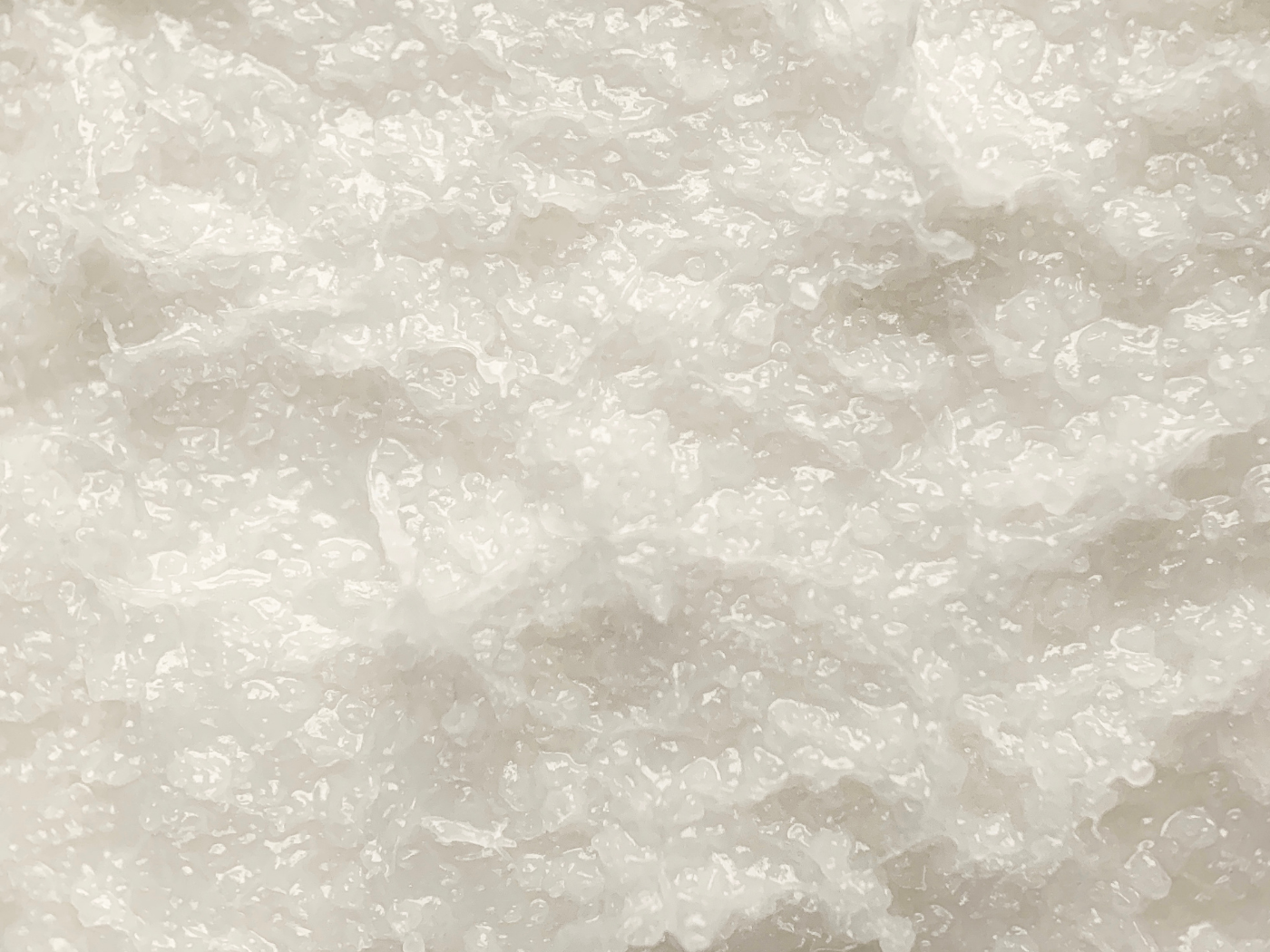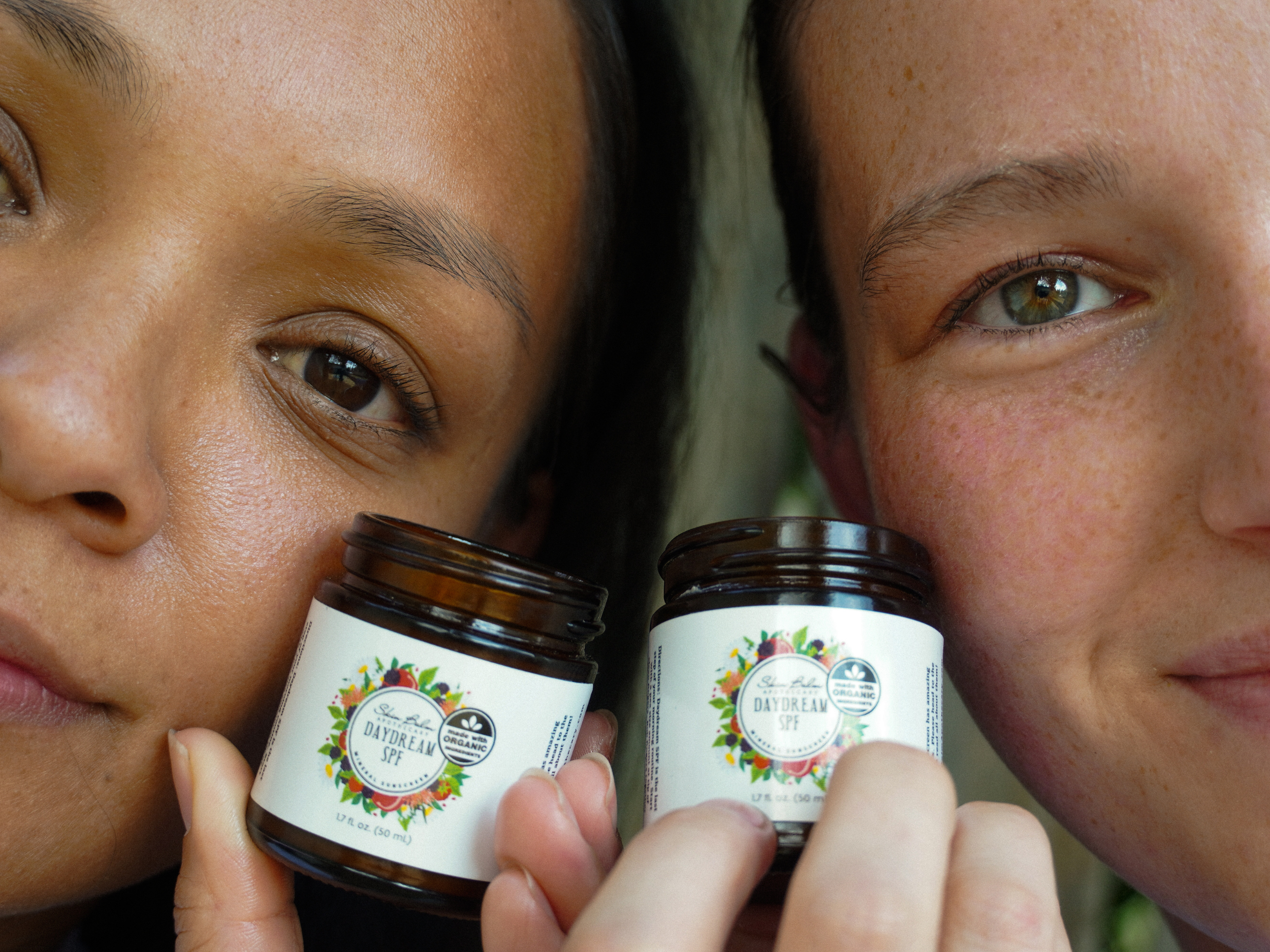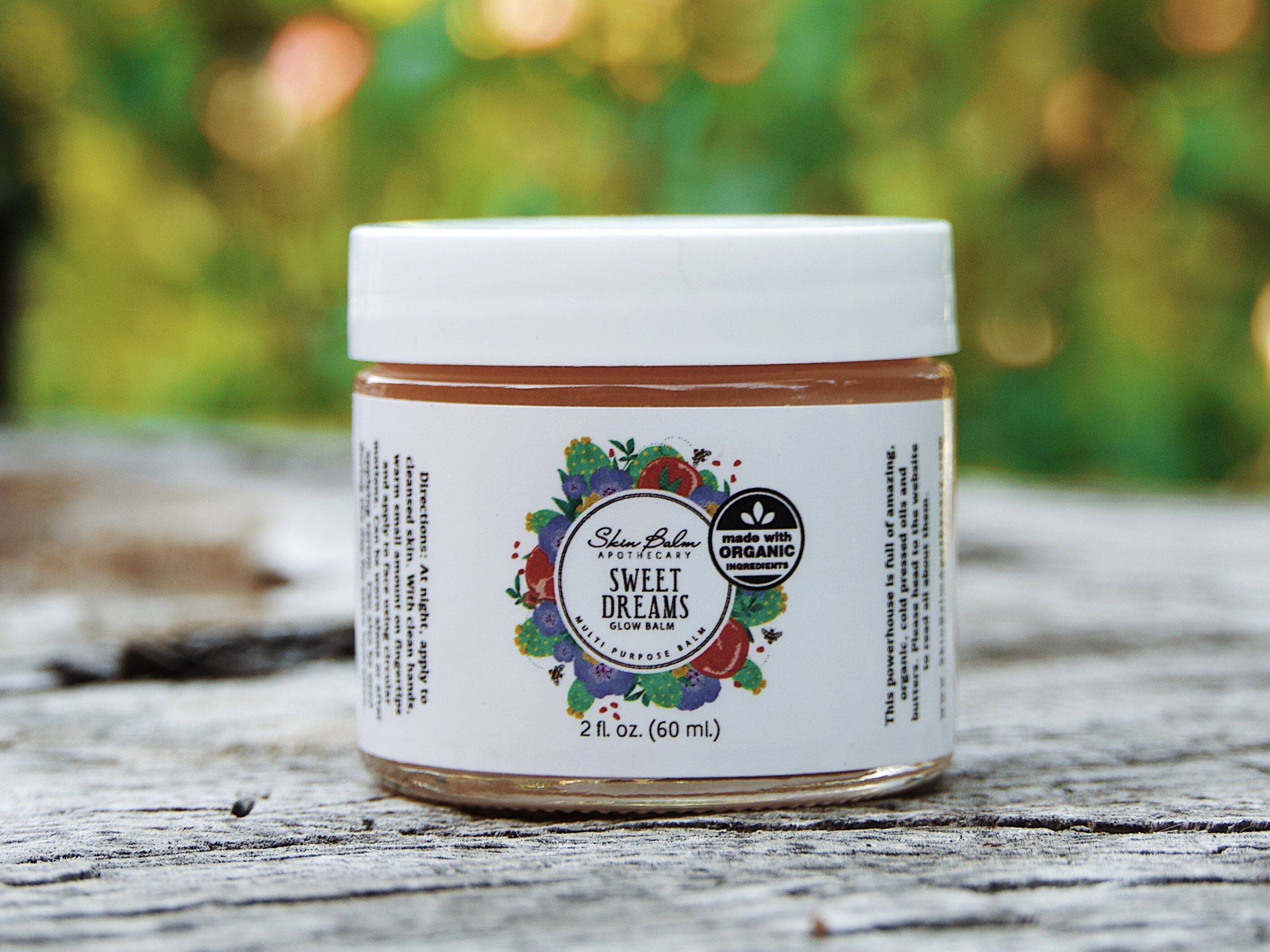
Common Misconceptions About Coconut Oil
Coconut oil has not only secured a spot on many kitchen shelves, but also on many bathroom shelves!
Coconut oil is one of the most talked-about ingredients in the natural skincare world. If you’ve ever searched for DIY beauty recipes, you’ve probably seen it recommended for just about everything: moisturizer, makeup remover, acne treatment, hair mask.
You may remember, but not too long ago coconut oil had its major moment. It was one of the biggest trends in skincare, and it seemed people everywhere were using it as skincare. (Kind of like how we’re seeing tallow gain traction right now!)
In fact, I remember a few of my friends who struggled with cystic acne and started using coconut oil as a daily moisturizer and face mask. Not only did it not help, but it made things significantly worse. Their skin became painfully inflamed, their breakouts deepened and they developed stubborn closed comedones. The healing process took months. Not a fun experience for them at all!
Now, don’t get me wrong, because we’re big fans of the power of plants, and we do believe coconut oil can be helpful when it’s formulated into products intentionally & in conjunction with other natural ingredients. We use the highest quality coconut oil in only a few of our products (keep scrolling to read which ones!). But here’s the thing: coconut oil is also one of the most commonly misunderstood ingredients in natural skincare.
But with great popularity can come great misunderstanding. Before you dive head-first into a jar of coconut oil, let’s explore why coconut oil might not be suitable for every skin type and need.
Note: When we talk about the drawbacks of coconut oil, we're specifically referring to applying straight, unformulated coconut oil directly onto the skin. This is very different from using intentionally crafted, herbal-based skincare products created by knowledgeable formulators and herbalists. When coconut oil is thoughtfully incorporated into a balanced formula, its benefits can be unlocked in a way that truly supports and nourishes the skin and even helps mitigate acne. However, we don't include it in any formulas meant for the entire face because it can be one of those ingredients that really does not work for everyone and we aim to create very low, to non-comedogenic formulas that work well for almost every skin type.
Common Misconceptions About Using Coconut Oil on Skin
Obviously, not everything you hear about coconut oil is true. Let’s clear up a few common myths:
-
"Coconut oil is super hydrating.” We hear this one a lot, and while coconut oil is an excellent moisturizer, there’s more to the story. Technically, “hydrating” means to add water. Pure coconut oil has no water, so it does not actually moisturize the skin. It's categorized as an occlusive adn forms a protective layer that locks moisture in. It does not actually deliver hydration to the skin.
Many have noted that when applying it on dry skin, it can sometimes leave you feeling greasy and dry at the same time. So, if you insist on using coconut oil as a body moisturizer, you'd need to layer it over damp skin, a serum, or a moisturizer. Otherwise, you’re just oiling the surface of your skin and creating an occlusive barrier on top of the skin. -
“It works as an acne treatment because it’s antibacterial.” It’s true that coconut oil contains lauric acid, which can kill acne-causing bacteria. However, that’s only half the story. Coconut oil, on its own, is also highly comedogenic, meaning it tends to block and clog pores a lot. On the standard 0–5 scale of pore-clogging potential, coconut oil scores around 4 out of 5 (5 being most likely to clog).
What does that mean? Even while it fights bacteria, it can simultaneously clog your pores and trigger breakouts when using it unformulated. So, no, coconut oil isn’t an acne cure-all. In fact, for many of us, applying just coconut oil straight to a pimple-prone face can make acne worse, not better. -
“It’s gentle and won’t irritate.” We wish this were always true but a "natural ingredient" doesn’t automatically equal to "gentle" for every person. Coconut oil can actually aggravate sensitive skin (thanks to it's high acid content) in some cases. So, always remember to do a patch test with any new ingredient, even ones from the earth. Better safe than sorry!
Why Coconut Oil Isn’t Great for Every Face
You’re certainly not alone If you’ve ever tried using coconut oil on your face and ended up with breakouts. Here’s why coconut oil can backfire (especially for certain skin types!):
-
High Comedogenic Rating: Like we talked about above, coconut oil’s does have a high tendancy of clogging pores. Think of it like this: it’s a thick oil that creates a barrier on the skin. Yes, that barrier can seal in moisture, but it can also trap dead skin and bacteria underneath, and irritate sensitive skin from the acids in it. This is a recipe for blackheads, pimples, and stubborn closed comedones for those with oily or acne-prone skin. Dermatologists often advise against using coconut oil on acne-prone areas (like your face, chest, or back) for this very reason.
-
Not All Skin Types Like It: If your skin is combination, oily, or sensitive, pure coconut oil can be a bit too much. Some people even report irritation or small rash-like bumps after using it on their face... Yikes! Again, this doesn’t happen to everyone, but it’s something to be aware of. Our skin’s pore size and sebum (oil) composition vary person to person, and coconut oil happens to be one of those ingredients that can work for some, but can be very volatile for others. Simply put, there's many other lower comedogenic oils that can do the same job without fear of negative side effects.
-
Acne and Fungal Concerns: Because coconut oil is so occlusive, it creates a warm, moist environment on the skin’s surface. This can worsen clogged pores or inflame existing blemishes for those prone to acne.
There’s also a type of yeast that can cause fungal acne (pityrosporum folliculitis), and it feeds on oils... Some anecdotal reports suggest coconut oil may trigger this in certain individuals depending on skin condition. The bottom line is → if you’re breaking out after using coconut oil, just listen to your skin and switch to something lighter!
Why (and How) We Use Coconut Oil in Only a Few Products
As a natural skincare brand that’s all about intentional, evidence-based ingredients, we take a balanced view on coconut oil. You’ll notice we include certified organic, raw coconut oil in just a few of our products, and here’s why:
- Coconut oil, on its own, isn't the enemy. It’s packed with many beneficial properties that are antibacterial, antifungal, anti-inflammatory. It's rich in fatty acids like lauric and capric acid which have been shown to support skin healing and even fight acne-causing bacteria. Plus, it can be amazing for your hair and body when formulated intentionally!
- So why does coconut oil show up on internet “pore-clogging ingredient” lists? Like we've discussed, it’s because people are applying straight coconut oil directly onto their face, without it being balanced by other ingredients. When used in isolation, especially on already-acne-prone or sensitive skin, it can completely overwhelm the skin’s barrier and lead to pore congestion.
- But what about when it’s used intentionally within a well-balanced herbal formula? That’s a whole different story! At SBA, we use certified organic, unrefined coconut oil when we know the formula will support and balance the skin barrier rather than put any burden on it. For example, the only "full face" product we offer with a form of coconut oil is our clarifying cleanser. Because of the way our formulator incorporates this ingredient into this product, it leaves only the acne fighting and beneficial properties of coconut oil in the final product. Our amazing educated herbalist, Chelsea, formulates with purpose and years of education, layering ingredients in a way that help unlock their benefits without triggering sensitivity or breakouts.
Here’s why we feel confident using coconut oil in a very select few of our creations:
-
Coconut oil speaks the same language as your skin. It contains fatty acids that are similar to those naturally found in your skin’s lipid barrier. When paired with the right plant butters, oils, and herbs, coconut oil can support your skin in retaining moisture and fighting off acne causing bacteria.
-
It’s never alone. We combine it with other non-comedogenic oils, herbal infusions, and humectants to make sure the final formula is nourishing, balancing, and skin barrier supportive. However, again, we don't include it in any formulas meant for the entire face because it can be one of those ingredients that really does not work for everyone and we aim to create very low, to non-comedogenic formulas that work well for almost every skin type.
-
It’s all about synergy. Your skin is smart and it knows how to absorb what it needs when it’s given ingredients that are thoughtfully crafted. Coconut oil, when used correctly, can be a part of that beautiful synergy!
-
We’re all about bio-compatibility. Our goal is never to load your skin with rich oils just for the sake of it, but it’s to create harmony. We only include coconut oil when it makes sense based on the needs of the formula and the skin it’s designed for.
That said, we totally understand that everyone’s skin is unique. That’s why we always encourage listening to your skin, adjusting your routine as needed, and asking questions if you’re unsure.
Bottom line? You don’t need to fear coconut oil when it's skillfully crafted into skincare products by formulators that know their stuff. You just need to know how and when it makes sense to use. With the right formulation, it can be a good addition for the skin.
In these formulas below, coconut oil is thoughtfully balanced with other herbs, oils, and botanicals to support skin healing, moisture retention, and even healthy hair growth.... without the risk of congestion that comes from using it in isolation!
Skincare:
-The Eye Balm™
-Clarifying Cleanser
Lip Care:
-Peppermint Lip Balm
-Orange Peppermint Lip Balm
-Lavender Orange Lip Balm
Body Care:
-Nourish Shampoo Bar
-All SBA Deodorants
Again, because we keep our facial product low to non-comedogenic, coconut oil doesn't make the cut for any of our full face balms, serums, moisturizers, or SPF as of now. However, because of the way Chelsea harnesses the antibacterial power of coconut oil for our Clarifying Cleanser, it totally makes the cut for that facial cleanser! Science is cool!
Where Coconut Oil Ranks On the Comedogenic Scale
For an in depth look into the comedogenic scale, CLICK HERE. In the meantime, I'll give you the quick version. The comedogenic rating of an ingredient is a number from 0 to 5 that ranks how likely it is to clog pores (and potentially cause comedones → pimples):
-
0-1: Won’t clog pores (e.g., hemp seed oil, argan oil). Generally considered safe for all skin types.
-
2: Low likelihood of clogging (most people won’t have an issue, but a few might).
-
3: Moderate chance – could go either way depending on your skin.
-
4: Fairly high chance it will clog pores for most people.
-
5: Very high likelihood of pore clogging
Coconut oil comes in at about a 4 on this scale.
I certainly hope this helped clear up any confusion surrounding coconut oil & helps you understand how it can be beneficial when formulated with expertise!
Here to help,
Brier.



